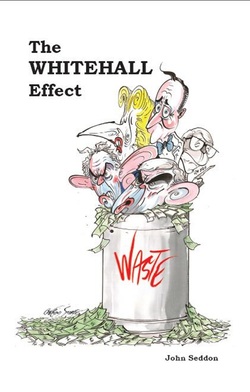The Whitehall Effect ~ John Seddon - Online Notes
|
Links below take you to the chapter notes:
Introduction 1. Prelude Part 1: The industrialisation of public services 2: Call centres 3. Back Offices 4. Shared Services 5. Outsourcing 6. Information Technology Part 2: Delivering services that work Introduction 7. A better philosophy 8. Effective change starts with ‘study’ 9. Better thinking, better design 10. ‘Locality’ working 11. IT as pull, not push Part 3: Things that make your head hurt 12. Targets and standards make performance worse 13. Inspection can’t improve performance 14. Regulation is a disease 15. It’s the system, not the people 16. Incentives always get you less Part 4: ideology, fashions and fads 17. Choice 18. Personal Budgets 19. Commissioning 20. Managing demand 21. Nudge 22. Procurement 23. Risk management 24. Lean 25. IT: features over benefits Part 5 Change must start in Whitehall 26. Beware economists bearing plausible ideas 27. Whitehall is incapable of doing evidence 28. Getting a focus on purpose |
6. Information Technology
1] Robin Gauld and Shaun Goldfinch, 2006, Dangerous Enthusiams: E-government, Computer Failure and Information System Development, Otago University Press. 2] Outcomes from IT investments: 80-90% do not meet their performance goals; 80% are late and over budget; 40% of developments fail or are abandoned; fewer than 25% integrate business and technology objectives; just 10-20% meet all their success criteria. See:, OASIG, Institute of Work Psychology, 1995, Failing to deliver: the IT performance gap, University of Sheffield. 3] House of Commons Committee of Public Accounts, 5 July 2013, The dismantled National Programme for IT in the NHS, Nineteenth Report of Session 2013–14, p.21. View 4] “Tim Donohoe, Senior Responsible Officer for Local Service Provider Programmes (LSPs), insisted that the NHS had ‘got a good deal for the taxpayer’… Donohoe said that the NHS couldn’t pull out of the contract all together on the basis of a breach – despite not fulfilling its terms – because it could have claimed things about how the NHS conducted itself and it was agreed that it was ‘not worth the risk of getting into further legal disputes’.” Quoted in Computerworld UK, 12 June 2013, ‘NHS still set to spend £600m with “rotten” CSC on “hopeless” NPfIT systems’. Byline: Derek du Preez. View 5] House of Commons Committee of Public Accounts, 24 June 2013, FiReControl: Update report, Sixteenth Report of Session 2013-14. View 6] House of Commons Communities and Local Government Committee, 5 June 2006, Fire and Rescue Service: Fourth Report of Session 2005–06 Volume I. View House of Commons Communities and Local Government Committee, 16 March 2010, FiReControl: Fifth Report of Session 2009–10. View 7] Computerworld UK, 23 July 13, ‘MPs attack rescue plan for £482 million FireControl project’. Byline: Matthew Finnegan. View 8] Dexter Whitfield, 2007 ‘Cost overruns, delays and terminations: 105 outsourced public sector ICT projects’ ESSU Research Report No. 3. View 9] View and View ‘Our net running costs in 2012–13, at £169m, were £5.1m higher than in 2011–12.’ 10] House of Commons Committee of Public Accounts, 14 November 2011, Rural Payments Agency - follow up to National Audit Office and Public accounts Committee Recommendations - corrected evidence Corrected transcript of Oral Evidence HC 1616-i’ Q167. View 11] See a short animation about the Prince 2 project management methodology. Prince 2 leads to plenty of activity but little understanding and, hence, plenty of failure. View 12] New Statesman, 19 February 2014, ‘Is Cameron now afraid to mention Universal Credit?’ Byline: George Eaton. View 13] Campaign4Change, 12 March 2014, ‘Another DWP leader quits – is Universal Credit IT really working?’ Byline: Tony Collins. View 14] The Guardian, 23 May 2014, ‘Watchdog now treating universal credit as 'new project' after successive delays’. Byline: Patrick Wintour. View 15] John Seddon, ‘Dissolving a Dangerous Enthusiasm: Taking a Systems Approach to IT Systems’, Cutter IT journal Vol. 26, No. 4, April 2013. View 16] The Independent, 10 March 2014, ‘Councils spend millions on controversial 'pseudo-science' lie-detector tests to help catch benefit frauds’. Byline: Ian Johnston. View 17] Ibid. 18] “The group’s first priorities, with immediate effect, will be to: … implement an immediate freeze on all new ICT spend above £1 million; review the government’s biggest projects, including ICT projects, to see where costs can be reduced or wasteful projects stopped altogether; start renegotiating contracts with major suppliers across government to reduce costs”, from a gov.uk press release, 24 May 2010, ‘Cabinet Office and Treasury to join forces to drive out waste’. View |

